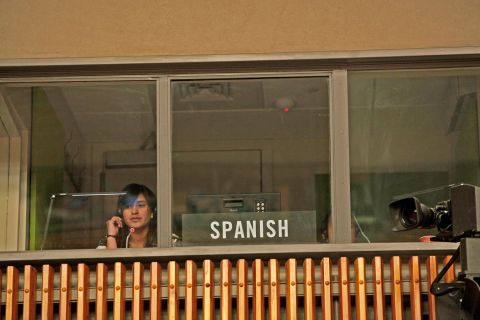Interpretation and Translation
A delegate may speak in any official UN language. The speech is interpreted simultaneously into the other official languages of the UN. At times, a delegate may choose to make a statement using a non-official language. In such cases, the delegation must provide either an interpretation or a written text of the statement in one of the official languages. Most UN documents are issued in all six official languages, requiring translation from the original document.
Multilingualism and the UN
Multilingualism enables communication between the UN's linguistically and culturally diverse Member States within the meeting rooms and halls of the UN. By promoting tolerance, multilingualism also ensures increased participation of all Member States in the Organization’s work, as well as greater effectiveness, better outcomes and more involvement. In order to eliminate the 'disparity between the use of English and the use of the other five official languages' and 'to ensure the full and equitable treatment of all the official languages,' as mandated by the UN General Assembly, the Department of Global Communications has set minimum standards for UN web multilingualism.
History of the UN’s Official Languages
The history of the UN’s official languages, presented by the Dag Hammarskjöld Library, gives the history of when each of the six official languages of the United Nations became official, beginning in 1946.
Universities Outreach Programme
The Universities Outreach Programme was established by the Department of General Assembly and Conference Management (DGACM), in order to address the language recruitment and succession planning goals of the United Nations, by giving guidance on language careers at the UN to students. It has information on the different language careers available at the UN, schools that train students for these careers, and other information.
The UN as Language Employer
The United Nations is one of the world’s largest employers of language professionals. Several hundred language professionals work for the Department for General Assembly and Conference Management (DGACM) in New York, Geneva, Vienna and Nairobi. Many more are hired by the regional commissions of the United Nations in Addis Ababa, Bangkok, Beirut and Santiago. At the United Nations, the term “language professional” applies to a range of specialized and interrelated occupations, mainly interpreters, translators, editors, verbatim reporters, terminologists, reference assistants, copy preparers and proofreaders.
Language Days at the UN
The Department of Global Communications has established language days for each of the UN's six official languages. The purpose of the UN's language days is to celebrate multilingualism and cultural diversity as well as to promote equal use of all six official languages throughout the Organization. Under the initiative, UN duty stations around the world celebrate six separate days, each dedicated to one of the Organization's six official languages. Language Days at the UN aim to entertain as well as inform, with the goal of increasing awareness and respect for the history, culture and achievements of each of the six working languages among the UN community. The days are as follows:
- Arabic (18 December)
- Chinese (20 April)
- English (23 April)
- Spanish (23 April))
- French (20 March)
- Russian (6 June)

